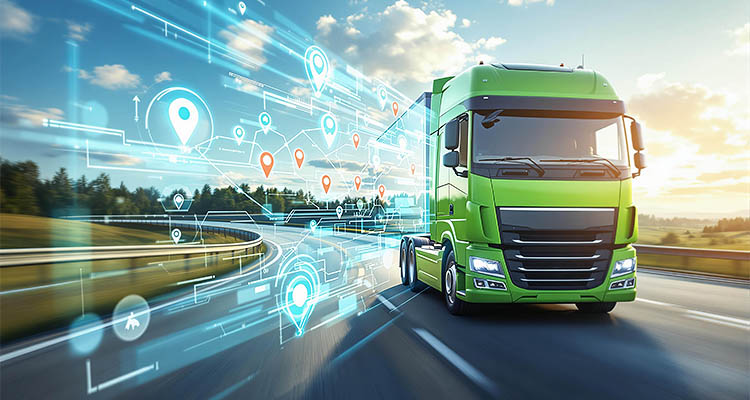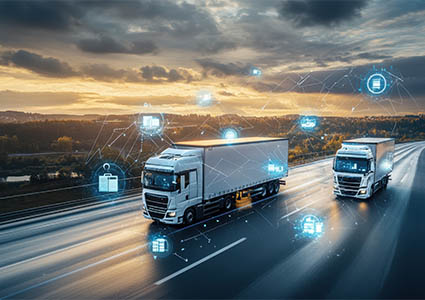
How haulage companies are contributing to retail’s shift towards sustainable consumerism
In recent years, an increased awareness of environmental and ethical concerns has driven a shift in consumer behavior towards more sustainable products and conscious buying, with many carefully considering the social, environmental and economic impact of their purchases.
There is a surging demand for visibility and transparency, with consumers wanting to know where and by what means products are reaching retailers. It is not just the point of sale that matters any more, but the entirety of its journey which is now under scrutiny from perspective buyers. Retailers who can offer eco-friendly and ethically sourced products are becoming more popular, amongst an increasingly conscientious customer base.

The haulage sector has a significant part to play in addressing this shift in consumer attitudes. It is a huge player in the UK’s economy, responsible for transporting a monumental 89 percent of all goods by land and therefore fulfilling a valuable and requisite role in the nation’s growth. As such, it can make a pivotal contribution to help the retail industry respond to the increasing consumer demand for green logistics and to meet the growing expectations for sustainable delivery options.
At HaulageHub, we operate a digital freight marketplace and leverage innovative AI technology to improve the sustainability and transparency of the supply chain. Empty running – runs made by Heavy Goods Vehicles without any cargo – account for more than 30 percent of HGV miles in the UK, producing over five million tons of needless CO₂ emissions per year and inviting substantial operational costs. This means the impact of the carbon footprint of the sector is far more profound than it needs to be and illustrates the need for retailers to embed sustainable initiatives across their operations.
Advanced AI models can help to match load opportunities with haulers, to reduce empty runs and minimize operational costs. Our technology ensures that loads are allocated to those with historically empty running routes to effectively address the issue where it is most prevalent. By continuously analyzing data in real time, AI can match haulers with available loads within their vicinity, accordingly, reducing unnecessary mileage and saving fuel, meaning an eco-friendlier journey.
We have managed to bring our average empty running rate to 19 percent, well below the industry average, and demonstrate that technology can be harnessed to improve the sustainability of the supply chain, meaning a greener product inventory for retailers. Such models also allow for load consolidation: by grouping part loads together, retailers can maximize truck capacity and increase efficiency. For all parties, this makes financial and environmental sense.
Haulage companies that can offer carbon footprint analysis of their drivers’ journeys within the retail sector are becoming even more sought-after as retailers scramble to meet sustainably targets. Data-driven insights that allow haulers to track and measure their emissions in real time empower retail companies to make informed decisions, enabling them to continuously improve their efforts towards a more sustainable offering for consumers.
 Predictive analytics and advanced algorithms can also be implemented to help haulers monitor the conditions of their vehicles to optimize route choice and prevent potential breakdowns. This means less fuel consumption and vehicle downtime, thereby increasing efficiency, benefiting profit margins, and ensuring a more sustainable drive. Retailers who employ haulage companies implementing such technology will be ahead of the curve in persuading their customer bases of their sustainable product offerings.
Predictive analytics and advanced algorithms can also be implemented to help haulers monitor the conditions of their vehicles to optimize route choice and prevent potential breakdowns. This means less fuel consumption and vehicle downtime, thereby increasing efficiency, benefiting profit margins, and ensuring a more sustainable drive. Retailers who employ haulage companies implementing such technology will be ahead of the curve in persuading their customer bases of their sustainable product offerings.
One of our major clients, a leading retail chain, has successfully reduced its logistics-related carbon emissions by 21 percent in the first year of their partnership with us. This proves the wholly fruitful effect of AI being implemented in the haulage sector in greening the supply chain and in improving sustainability efforts from retailers. It provides demonstrable proof to consumers of the efforts being made to reduce carbon emissions associated with their products through more eco-friendly deliveries.
Going forward, the integration of electric and hydrogen-powered vehicles across the supply chain will help to expedite the transition to zero-emissions vehicles and therefore reduce the carbon footprint of the entire logistics sector. If implemented on a large scale, retailers can be assured that those delivering their goods are doing their utmost to help meet the demand from consumers for ethically sourced products.
As more and more people are making conscious, sustainable purchasing decisions, it is imperative that retailers respond accordingly. The haulage industry can be crucial in helping them meet their green goals and in proving their sustainability credentials to their consumers, who are now prioritizing purchases which align with their own values and beliefs. Given that achieving sustainability across a retailer’s supply chain operations also means improved efficiencies and considerable cost savings, it seems there is a rather persuasive business case from a retailer’s perspective in striving for sustainable logistics.
For a list of the sources used in this article, please contact the editor.
Scott Robertson is co-founder of HaulageHub, the leading digital freight marketplace intended to address the inefficiencies that have traditionally marred the freight sector and to improve sustainability within the industry. The company helps retailers to reduce their carbon footprint by tackling the issue of empty running in the sector, which contributes over five million tons of unnecessary CO₂ emissions annually. Leveraging innovative AI technology, it matches load opportunities to a hauler base of 1500+ firms, consolidates loads, and optimizes routes to green supply chain operations, improve efficiencies, and enhance profit margins.